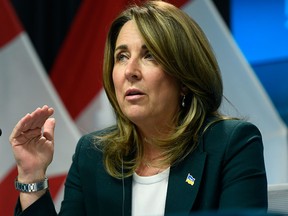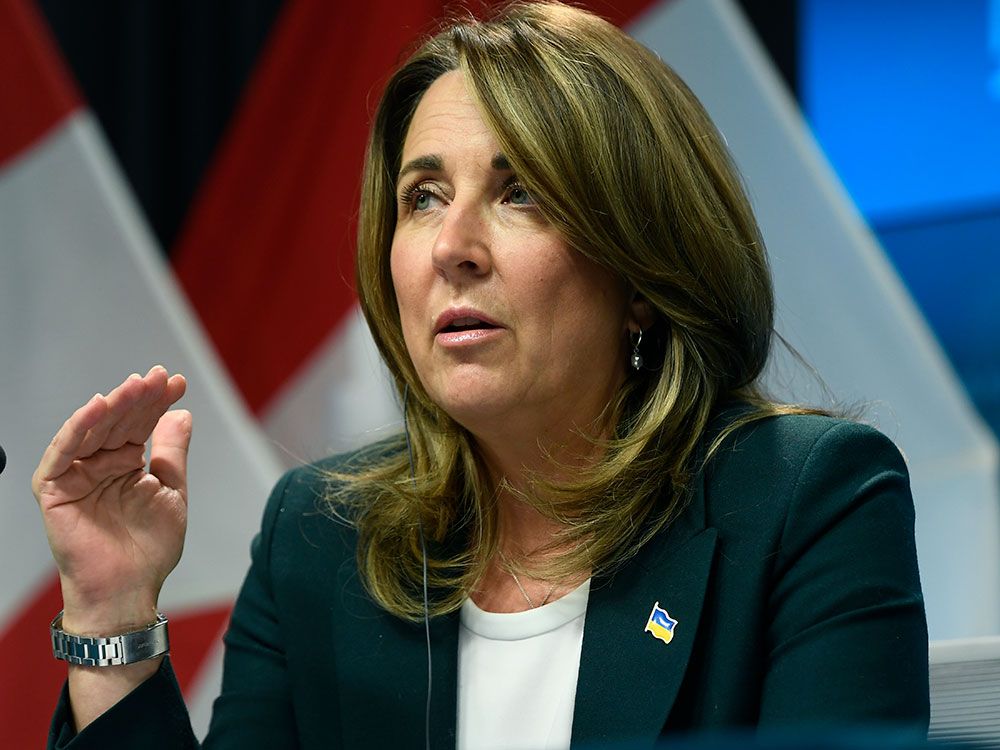Carolyn Rogers does not rule out 75-basis-point hike in July

Article content
The Bank of Canada’s senior deputy governor said inflation is keeping the central bankers “up at night” and did not rule out a three-quarter point hike after data revealed CPI has hit a near 40-year high.
Advertisement 2
Article content
Carolyn Rogers reacted to the 7.7 per cent gain in the inflation rate hours after Statistics Canada released the data on Wednesday, calling it an “unwelcome number,” but not “an entirely unexpected number” at a Globe and Mail event.
Canadian consumer prices increased in May at rates not seen since January 1983, beating economists’ forecasts and turning up the pressure on the central bank to follow the U.S. Federal Reserve with a supersized 75-basis-point hike.
The inflation rate is higher than the 6.8 per cent reading in April and far above the Bank of Canada’s own forecast that it would average 5.8 per cent this quarter.
“Inflation is too high; it’s hurting Canadians,” Rogers said at the Toronto conference. “It’s keeping us up at night and we will not rest easy until we get it back down to target… That’s why we’re raising interest rates and as we say, we’re raising them quite aggressively.”
Advertisement 3
Article content
Rogers echoed other executives at the bank, such as deputy governor Paul Beaudry, who have suggested interest rates may need to exceed the neutral rate — a range estimated at around two and three per cent — to neither boost nor restrain economic growth.
When asked if that meant a 75-basis-point hike at the bank’s next decision due on July 13, Rogers did not rule out the possibility.
“We’ll take the July decision when we get to July,” she said. “We’ve been clear all along, the economy is in excess demand, inflation is too high, rates need to go up.”
More economists, such as Royce Mendes, managing director and head of macro strategy at Desjardins Group, expect the central bank to unleash a “jumbo-sized” 75-basis point hike. The central bank should have made such a move earlier this month to get a handle on prices, Mendes said.
Advertisement 4
Article content
Rogers pointed to rampant inflation as a risk and said the most important task right now is to get inflation back to target (between two and three per cent) with “the least amount of unintended consequences possible.”
-

Inflation surges to 7.7%, fastest since 1983: What Canadians need to know
-

What economists say about soaring inflation and the Bank of Canada
-

Milk prices are going up again as critics say dairy decisions too secretive
-

Freeland says Ottawa ‘prepared to do more’ if inflation stays hot
“We see a path to do that. Our view is that we can take some of the excess demand out of the economy and bring it back into balance,” she said.
Hikes that have brought the bank’s benchmark rate from 0.25 per cent early this year to 1.5 per cent are already having an effect, she said.
Advertisement 5
Article content
“We are seeing moderation in the housing market… We know the parts of the economy that are most sensitive to interest rate changes are where Canadians borrow, that’s how monetary policy works, it works in bringing borrowing costs up. The demand economy is dependent on borrowing, you’ll see a quick reaction…”
Rogers reiterated that while the central bank was watching this part of the economy very closely, monetary policy would focus on taming inflation that affects all Canadians through the cost of groceries, gasoline and other items.
The bank also thinks global inflation will start to ease as the lingering effects of the pandemic recede, she said.
Additional reporting by Reuters
• Email: shughes@postmedia.com | Twitter: StephHughes95


